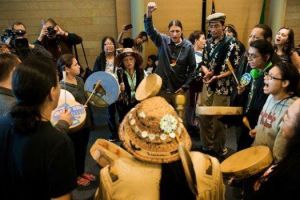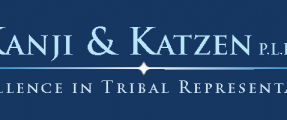
Renée Roman Nose, Mayor Murray, Zona Evon, Ethel Branch Photo Credit: Chris Stearns
On Monday, October 13, 2014, the City of Seattle celebrated Indigenous Peoples’ Day for the first time, just one week after the Seattle City Council passed Resolution No. 31538 declaring the observance. On the day of the celebration, Mayor Murray signed the Resolution in a room packed with supporters. This historical moment marks Seattle’s commitment to a unique and human rights-driven approach to engaging with local Native Nations and with the significant urban Indian population that resides within Seattle.
Resolution No. 31538 recognizes that the city is built on Indigenous lands, acknowledges the contributions of the Indigenous Peoples of this region, and seeks to close the equity gap for Indigenous Peoples of Seattle. It establishes as official policy that city staff will participate in the annual Indigenous Peoples’ Day celebrations; encourages businesses, organizations, and public entities in the city to recognize the Day; and strongly encourages Seattle Public Schools to include the teaching of Indigenous Peoples’ history in its curriculum. Seattle Public Schools passed its own resolution on October 1st recognizing Indigenous Peoples’ Day and strongly encouraging district staff to teach the culture, history, and governments of the Indigenous Peoples of the region.
Resolution No. 31538 builds on the efforts of the 1977 delegation of Indigenous Peoples that proposed observance of the day to the United Nations and of the Affiliated Tribes of Northwest Indians, which passed a 2011 resolution supporting the observance of Indigenous Peoples’ Day. The Resolution was proposed by local Native community members and supported by the Seattle Human Rights Commission, which passed its own resolution requesting that the city and Seattle Public Schools recognize the second Monday of October as Indigenous Peoples’ Day.

Native community members, including Matt Remle (with fist raised) and Nahaan (right of Matt), commemorating the day. Photo Credit: Chris Stearns
Successful passage of the Resolution was the result of the stalwart leadership of Matt Remle (a member of the Hunkpapa Lakota (Standing Rock Sioux Tribe) and one of the community members who presented the Indigenous Peoples’ Day proposal to the Human Rights Commission) and Millie Kennedy (a Tsimshian (Raven Clan) attorney at the Northwest Justice Project who helped organize events leading up to and memorializing the Day), the Seattle Human Rights Commission (including Co-Chair Ethel Branch, a member of the Navajo Nation and an Associate at Kanji & Katzen, PLLC), the City Council (including Resolution Co-Sponsors Bruce Harrell and Kshama Sawant), and Mayor Murray (including his Tribal Liaison, Nicole Willis, a member of the Confederated Tribes of the Umatilla Indian Reservation).
The effort was also buoyed by the support of local tribal leaders, including Fawn Sharp (President of Quinault Indian Nation and President of the Affiliated Tribes of Northwest Indians), Leonard Forsman (Chairman of Suquamish Indian Tribe), Ron Allen (Chairman of the Jamestown S’Klallam Tribe), David Bean (Councilmember of Puyallup Tribe of Indians), and Theresa Sheldon (Board Member of Tulalip Tribes and co-author on the ATNI resolution calling for recognition of Indigenous Peoples’ Day).
The city’s action is one positive step forward on the path to advancing indigenous human rights in the Pacific Northwest, and it enhances the city’s status as a human rights city. Indigenous Peoples elsewhere may soon join in this celebration as national momentum builds to observe the second Monday in October in similar fashion. Minneapolis officially recognized the day as Indigenous Peoples’ Day in April, and on October 13, 2014, the City of Bellingham recognized the day as Coast Salish Day. Berkeley and other California cities made the name change long ago, and several states do not observe Columbus Day, including Alaska, Hawaii, Oregon, and Washington. South Dakota observes Native Americans’ Day.
For coverage of this important change in the Seattle Times, please follow these links:
Mayoral Signing: http://seattletimes.com/html/localnews/2024772785_indigenoussigningxml.html
City Council Vote: http://seattletimes.com/html/localnews/2024715781_indigenousdayxml.html
Pre-Vote: http://seattletimes.com/html/localnews/2024708926_columbusday2xml.html

